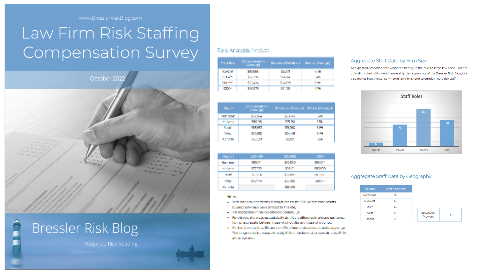BRB Law Firm Risk Staffing Compensation Survey (2023 Edition) — Now Open!
Posted on
I’m pleased to invite our law firm risk readers to participate in the 2023 Risk Staffing Compensation Survey!
Last year’s exercise proved to be a great success. We saw participation from 80+ individuals, who contributed data on 375+ individual risk staff positions. (Let’s see if we can’t top that figure this year, shall we?) The final report came in at 14 pages and certainly proved popular.

I also received many encouraging notes of feedback and input from risk staff, risk managers, and firm leaders.
- Kudos to those managers using this industry data to advocate for and ensure that their team’s compensation is kept in line with industry averages.
- It was great to see several firms using the data to inform their staff recruiting and offer processes
- And it was particularly nice to hear from several individuals who were able to use the data to self benchmark and support their personal career efforts and growth.
This year’s exercise incorporates some lessons learned from 2022.
So if you’re an individual contribution looking to understand how your comp compares to your peers, or you’re a risk manager looking to keep your team (and potential new hires) on par with changing market standards, you don’t want to miss out.
SURVEY DETAILS:
- Participation open to law firm risk professionals only
- All responses will be treated confidentially
- Manager participants sharing data on their/their team’s roles and compensation will receive a report summarizing key findings and analysis
- (The report may be shared internally within your firm, but not redistributed externally. So if you want the results, your best path is to participate!)
- Individual contributor participants sharing personal compensation data will be receive a personal benchmark compensation summary relevant to their specific role and firm demographics.
The survey will be open for the next month or so and can be accessed here: 2023 Risk Staffing Compensation Survey.
Feel free to share the link with law firm peers and colleagues.
And if anyone has questions, please do reach out to me directly. (Email readers can do that by just replying to this note — it’ll reach me. Others can use the contact form as well.)
Let’s see what we learn this round!

